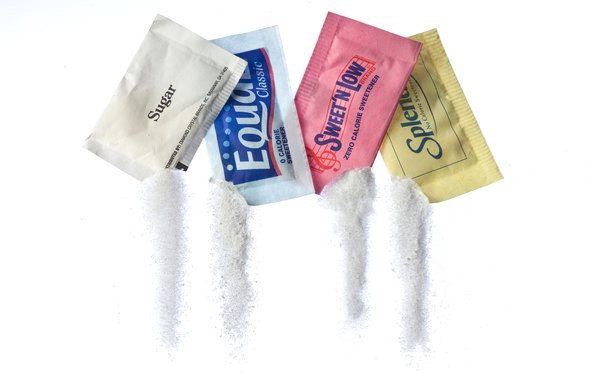Artificial Sweeteners and Your Gut Bacteria
Studies continue to link artificial sweeteners to increased risks for cancer, weight gain and diabetes, now showing how they influence your gut bacteria.
Several research studies have made associations between artificial sweeteners and increased risk for cancer, weight gain and diabetes, but nobody has yet demonstrated that artificial sweeteners cause these conditions. In a recent study, researchers used genetically modified bioluminescent bacteria from E. coli to show that taking artificial sweeteners causes toxic bacteria to overgrow in the gut and produce chemicals that are harmful to humans. This study supports an earlier study from the University of North Carolina and University of Georgia that showed that artificial sweeteners change gut bacteria to those that block the disease-preventing benefits of eating soluble fiber in fruits and vegetables.
Artificial Sweeteners - How They May Affect Gut Bacteria
Many studies show that the bacteria in your colon have a strong role in controlling your immunity. The bad bacteria try to enter and damage the cells lining your colon, which turns on your immunity and can keep it active to cause inflammation and diseases - the so-called “leaky gut”. The good bacteria are happy to stay inside your colon where they eat the same food that you do. The good bacteria convert soluble fiber in vegetables and fruits into short chain fatty acids (SCFA) like butyrates. These SCFAs help lower high cholesterol and high blood pressure, and make your cells more responsive to insulin which helps prevent diabetes and reduce inflammation that can cause cancer and heart attacks. Artificial sweeteners appear to foster the growth of the bad bacteria and block the good bacteria that produce short-chain fatty acids.
Artificial sweeteners also appear to make you hungry so that you eat more food, which increases risk for weight gain and diabetes. Chronic consumption of artificial sweeteners actually trick your taste buds and brain and this can increase the overall motivation to eat more food leading to weight gain. Artificial sweeteners, even natural ones like stevia, which comes from an herb, are hundreds, sometimes thousands, of times sweeter than sugar. Evidence suggests that exposing your taste buds to these high-intensity sweeteners makes them less receptive to natural sources of sweetness such as fruit. When your taste buds get dulled, you're more likely to seek out sweeter and sweeter higher calorie foods. Evidence also comes from Canada’s University of Manitoba, where researchers reviewed 37 studies that included data on more than 406,000 people followed for an average of 10 years. In 30 of these studies researchers found an association between use of artificial sweeteners and an increase in body mass index. The researchers also reported a 14 percent higher risk of developing type 2 diabetes among those who consumed the most artificial sweeteners compared to those who consumed the least.
Sugared Drinks Are Also Harmful
Sugar in liquid form raises blood sugar more quickly than any other type of food. One can of sugar-sweetened soda contains 25 to 50 grams of sugar, the recommended upper limit for sugar for an entire day! Because of their high sugar content and lack of fiber, all fruit juices and fruit drinks are just as unhealthful as sodas. Sugared drinks have been associated with weight gain, increased risk for diabetes, Alzheimer's disease, high blood pressure, high cholesterol, heart attacks, and strokes.
Bottom Line
Both sugar-sweetened drinks and artificially-sweetened drinks can be harmful to your health. Sugared drinks are useful during prolonged, vigorous exercise, but at all other times, I recommend that you use water to quench your thirst. Unsweetened coffee and tea also appear to be safe and healthy.

